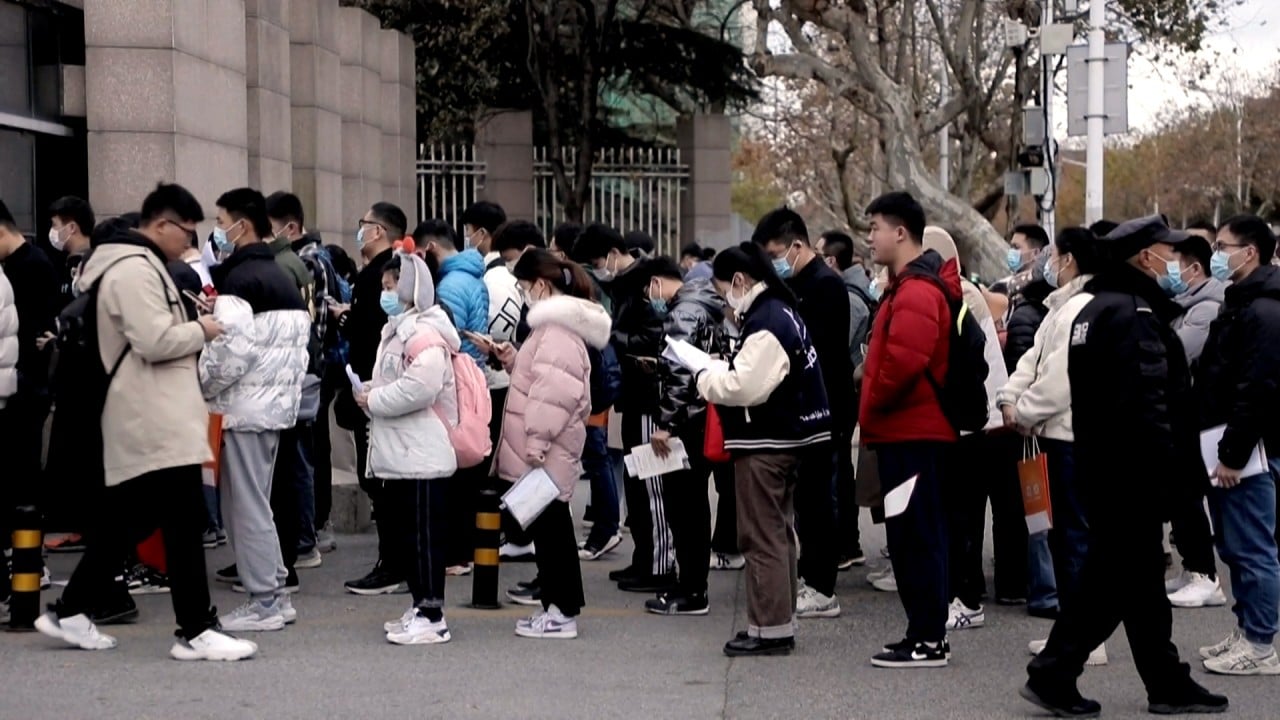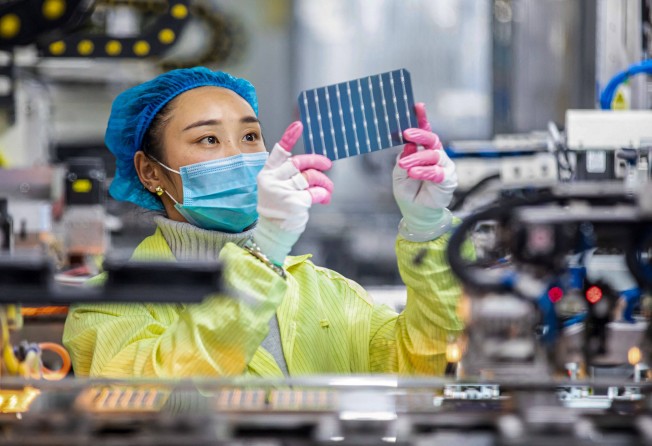
01:12
Record 2.1 million Chinese sit civil service exam as economy slows, youth jobless rate climbs

After graduating from a vocational school with a degree in chemical equipment maintenance in 2019, Zhang Cheng joined a natural gas company in northwest China on a salary of 6,000 yuan (US$941) per month, higher than the national average for all graduates that year.
While people around him envied his wage, working on the shop floor was no walk in the park, he said.
“I work in a noisy environment, with a lot of soot and steam and low-oxygen levels, and there are a lot of cryogenic liquids around me, all of which are dangers people often face in this industry,” the 24-year-old said.
Though dirty and dangerous work can be part of the job, the salaries of blue-collar employees in China are not low.
In 2020, migrant workers, who account for the largest share of China’s blue-collar labour pool, earned an average monthly income of 6,214 yuan, an increase of 6.2 per cent over the previous year, according to the National Bureau of Statistics. In the first six months of last year, the median per capita disposable income was 14,897 yuan per year, official data showed.
Wages can be even higher for workers in the gig economy, with nearly 40 per cent of couriers, online taxi drivers and delivery workers earning an average monthly income above 9,000 yuan, according to the New Blue Collar Employment and Living Conditions Research Report, released by the Data Centre of China Internet in 2020.
Put into context, that figure was higher than the average starting salary for university graduates in 2020, the report said.
But the relatively generous incomes have failed to staunch a growing shortfall of workers in Chinese industries that rely on manual labour, with the government estimating tens of millions of jobs may go unfilled by 2025.
Industry insiders say the problem can partly be explained by long-held perceptions that blue-collar, or “technically skilled”, jobs are inferior and for people with a poor education. Many recent graduates are opting for stable civil service jobs, especially amid the pandemic, too.
Nearly 70 per cent of Chinese businesses face labour shortages, and 55 per cent of companies are struggling to find blue-collar workers, according to the Blue Collar Employment and Compensation Management Report 2021, from China International Intellectech, a human resources company.
The Ministry of Human Resources and Social Security said in January last year that of the 100 occupations with the greatest worker shortages, as many as 36 were categorised as “manufacturing and related personnel.” Of the 25 new occupations on the list, 15 were directly related to manufacturing, accounting for 60 per cent of the total.
While there is an overflow of people looking for office jobs, by 2025, there will be a shortage of nearly 30 million workers in the manufacturing sector, the Ministry of Education has estimated.
Zhang Xiaorao, director of Silk Road Vocational College, which trains mechanics and automation technicians, said students were usually hired in advance of graduation, such was the demand for workers.
Students usually undergo a one-year internship after a two-year professional course, and companies contact faculties in advance to express what type of interns they need, she said.
“Companies have seen an increase in export orders after the pandemic, and now companies are coming to recruit even more employees than before,” said Zhang.
Traditional Chinese Confucian culture is an important historical reason for society’s prejudice against “skilled workers”.
“The ancients divided jobs into ‘three teachings and nine sects’ and those at the bottom of this chain are all skilled workers, which is a deep-rooted concept among many Chinese people, who believe these workers are in undignified professions,” Zhang said.
Since 2009, the government has provided vocational schools students free tuition, accommodation, meals, and a subsidy of 2,000 yuan a year for poor pupils. Zhang said that showed the government was taking vocational training seriously.
Last year, Beijing issued several new guidelines to address discrimination against students graduating from vocational schools. In October, for example, the labour ministry outlawed employers from hiring based purely on where a job applicant studied.
In December, the Standing Committee of the National People’s Congress also recommended changing the term “technically skilled personnel” to “highly qualified and technically skilled personnel”.
“Changing the name of the workers also sidesteps social discrimination against these industries,” Zhang said.
Liu Kai, the owner of a car repair shop in Shenzhen, said it was becoming more difficult to recruit workers in his industry each year.
The often monotonous work and irregular hours were the main reasons why young people were reluctant to take up work as a mechanic, he said.
“They need to repeat some tedious work every day, there are no fixed holidays, the daily working hours are around 12 hours,” Liu said. “Young people nowadays are generally unwilling to suffer such hardships.”
Furthermore, it takes years of experience to become a skilled technician or a specialist.
“But today young people are rarely willing to stick around, as opposed to being civil servants and working in a comfortable environment,” he said.